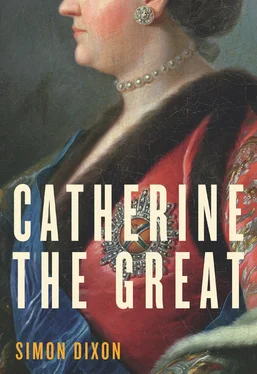As Catherine prepared for a Te Deum in honour of the peace treaty at the Kazan Church on Sunday 3 August, the pretender was already carving a swathe through the steppe. 90Routed by General Mikhelson in a four-hour battle at Kazan on 13 July, he had retreated southwards into an area settled mostly by nobles owning fewer than twenty serfs. These were the plentiful lands that Catherine had so admired on her Volga cruise only seven years earlier. Now, in the last and bloodiest phase of the revolt, the peasants flocked to the rebel cause in increasing numbers, burning their lords’ manor houses and slaughtering many of their ‘unjust’ and ‘cruel’ occupants. Penza fell to Pugachëv on 1 August, Saratov five days later. But even as he marched towards his native Don Cossack territory, the unsuspecting pretender was finally approaching his nemesis. Shortly after he drew up at the outskirts of Tsaritsyn on 21 August, one of his fellow Cossacks finally recognised him as an illiterate imposter. Once ‘the world of suspended belief’ in which so many of his followers had lived was shattered, it was only a matter of time before the so-called Peter III was defeated once and for all. 91On 25 August, while Catherine was lunching with Potëmkin in the Hermitage in preparation for Natalia’s name day, Mikhelson inflicted a final devastating defeat. 92Though Pugachëv again escaped capture, this time his luck was out. On 15 September, the Cossacks betrayed him to the authorities and the greatest revolt of Russia’s eighteenth century ended in ignominy.
As the authorities began their interrogation of the pretender, the autumn balls had already begun in St Petersburg. Catherine prepared for the winter by inspecting an array of valuable sables and silks, laid out for her in the Summer Palace much as they had once been for Empress Elizabeth. 93This time there were no rash announcements about the fate of the rebellion, but two days after Paul’s twentieth birthday, she celebrated the twelfth anniversary of her coronation in greater security than she had enjoyed for at least four years.
Potëmkin’s incipient rivalry with Nikita Panin was meanwhile being played out at a secondary level in the struggle between their relatives for control over the investigation into the revolt in Kazan. ‘Count Panin wants to make his brother the ruler with unlimited powers in the best part of the empire,’ Catherine complained, as Peter Panin departed for the Volga at the end of July. Though Catherine was anxious to keep the Panins’ pretensions in check, Peter’s appointment signalled a noticeable change of policy. Until then, the government had been moderate in its treatment of the rebels. In March Catherine had explicitly urged Bibikov to be cautious in his methods: ‘For twelve years the Secret Expedition under my own eyes has not flogged a single person under interrogation, and every single affair has been properly sorted out, and even more came out than we needed to know.’ Most of the prisoners taken from the rebels had been released without harm. Now retribution was placed in the hands of Peter Panin, a martinet who calculated that 324 insurgents were executed during his time in charge. A further 399 lost an ear and were knouted; 7000 more were flogged in other ways. 94
Nothing could compare in Catherine’s mind with the damage inflicted by Pugachëv himself. ‘There has hardly been anyone so destructive of the human race since Tamerlane,’ she spluttered to Voltaire in October. ‘He entertains some hope that I might treat him gracefully, saying that he might erase the memory of his past crimes by his courage and future services. If it were only me that he had offended, his reasoning would be just and I would pardon him; however, this is the empire’s cause and the empire has laws.’ 95Brought to Moscow in an iron cage on 4 November, Pugachëv was subjected to a secret trial at the Kremlin at the end of December. Vyazemsky was on hand to make sure that no torture was applied. Though the rebel was sentenced to be quartered, Catherine gave orders that his executioner should behead him first, much to the rage of the ghoulish mob that gathered to witness the event on Bolotnaya Square on 10 January. 96Five days later, as a symbol of her determination to look forward rather than back, she decreed that the Yaik, the name of the river where Pugachëv had begun his revolt, should be changed to the Ural, ‘so that the unhappy occurrences on the said Yaik should be forgotten forever’. 97Her wider ambition was now to consign to the same oblivion the ‘blindness, stupidity, ignorance and superstition’ that had tempted her subjects into rebellion. And that meant tackling the ‘weakness, indolence, carelessness in respect to their duties, idleness, arguments, disagreements, extortions and injustices’ perpetrated by her inadequate provincial officials. 98The task of improving local government was to preoccupy her for much of the following decade.
* * *
With Pugachëv gone, Moscow was safe to visit, seven years after Catherine had last set foot in the old capital. ‘Seven years seems like a whole century to us,’ Sumarokov made the populace exclaim in his Ode to Potëmkin in 1774. But since the empress was less certain of a rapturous reception, she delayed her departure until news of the pretender’s execution had been confirmed, making her formal entry into Moscow on 23 January 1775. 99Passing two newly erected triumphal arches, commemorating her victories against the Turks, she processed to the customary service at the Dormition Cathedral, and from there to her new palace, where she retired to her apartments. ‘The whole passed with scarce any acclamations amongst the populace, or their manifesting the least degree of satisfaction,’ Gunning reported secretly to Whitehall. ‘The Empress’s visit here is far from agreeable to them, and as little so to the nobility. Her Majesty is not ignorant of this, nor of the little affection they bear her; nor are they less acquainted with the unfavourable opinion she entertains of them.’ 100
Inside the porticoed entrance of the Prechistensky Palace, Matvey Kazakov had created a large reception room leading to a throne room, just as big, where Catherine could receive the ambassadors. Beyond that lay a still greater apartment, running the length of the building and divided by columns: she played cards in one half while her courtiers danced in the other. 101‘To be fair,’ as she acknowledged to Grimm, the conversion had been artfully done. But she enjoyed poking fun at the ‘labyrinth’ connecting the disparate parts of her new palace, portraying her new study as ‘a triumph of exits’ from which it had taken her two hours to escape. ‘I have never seen so many doors in my life. I have already condemned half a dozen of them, and I still have twice as many as I need.’ 102
Thrust into this unfamiliar environment, Catherine and Potëmkin struggled to maintain the explosive intensity of their initial affair, relapsing instead into bickering about the terms of their relationship. It was already clear that they were partners in government. Indeed, when her sulky lover took offence at some corrections she sent him, she assured him that they were ‘only guidelines’ from which he could make his own choice. While he set to work to ensure that there could never be another Pugachëv, she concentrated on commemorating the defeat of the Turks. At first sight, it was Potëmkin who had the more ambitious task and he set about it with characteristic ruthlessness. Powerless to intervene, Panin watched in horror as the new favourite heaped obloquy on the errant Zaporozhian Cossacks barely twelve years after they had taken a proud role at the empress’s coronation. Their host was summarily disbanded on 3 August and its territory assimilated under the regular imperial administration. 103Meanwhile, Catherine had taken responsibility for an equally visionary piece of legislation. The manifesto commemorating the end of the Turkish war on 17 March 1775 has rightly been accorded ‘considerable importance in the history of human rights in Russia’ because it offered unprecedented protection to the individual by preventing the arbitrary enserfment of the population by census-takers who had deprived more than 830,000 men of their freedom between 1721 and 1741 alone. 104
Читать дальше












